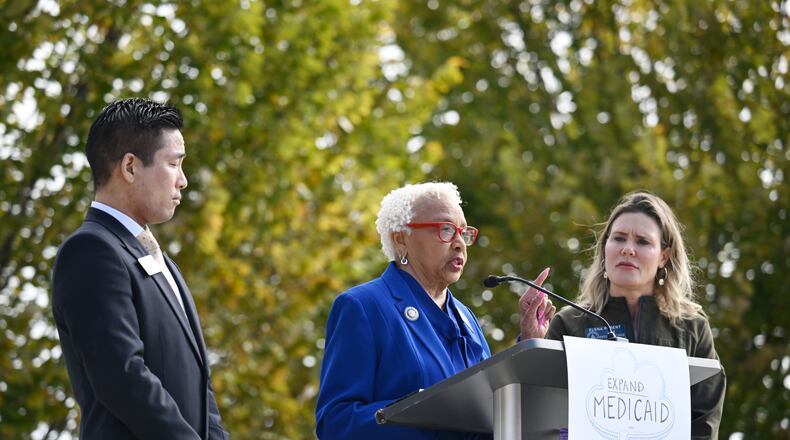When federal Judge Steve Jones ruled earlier this month that Georgia’s current GOP-drawn legislative districts violated the Voting Rights Act, liberal voting groups felt vindicated.
They had warned that the original maps discriminated against Black voters when the Georgia General Assembly passed them in 2021, and they said Jones’ decision only proved they were right.
But when Republicans unveiled new maps this week to comply with Jones’ directions ahead of a court-ordered special redistricting session, the mood among Democrats turned quickly from victory to defeat.
That’s because the new proposed legislative maps, made public just a day before the session began Wednesday, did indeed comply with Jones’ order to create new majority-Black districts. But the changes came primarily by overhauling existing Democratic districts instead of districts held by the Republican majority.
Democrats shared hugs and pained expressions in the House chamber as that reality settled in. Fuming Senate Democrats decried the maps moments after the special session gaveled in.
State Sen. Gail Davenport of Jonesboro was among the many to say the new maps dilute Black voters’ voices instead of strengthen them. “I guess you all thought we would sit by and say nothing,” Davenport said to the GOP majority. “But those of us who are Black here know why we were sent here. … Stop diluting the Black vote.”
On the Senate side, no incumbents were drawn into races against each other. But several Democrats, including state Sens. Jason Esteves, Elena Parent and Doc Rhett, saw dramatic changes in the neighborhoods and minority populations they’d represent.
At a Senate hearing to vote on the new Senate map, Rhett said his district would fall from more than 40% Black to 32% Black. “That’s a significant drop, and you have to wonder, since this is a minority opportunity district, why is that happening? And how can I explain that to people in my district?”
Rhett answered his own question: The reality is that he, a Black lawmaker, could easily lose his seat in 2024 as a result. More importantly, “It means that the people in my district will probably be disenfranchised,” he said.
David Garcia, a Hispanic voting rights advocate, told the same Senate committee that changes in Esteves’s Atlanta district amounted to a GOP effort to oust him.
Other Democrats, on the House and Senate side, said the gains for Democrats in the form of new majority-Black districts are just a reshuffling of existing Democratic seats, not real changes in representation.
“In many ways the Republican proposal is a hoax,” said state Sen. Gloria Butler, the first Black woman to lead a Senate caucus in Georgia. “It’s smoke and mirrors.”
But state Sen. Shelly Echols, the top Republican on the committee, said she had only one goal this week.
“I told every member that I met with that my primary goal is simply to comply with the Georgia judge’s order,” she said.
While the Senate didn’t draw incumbents into races against each other, House members weren’t so lucky.
The new House map creates five new majority-Black districts as ordered, but it also draws six House Democrats and two House Republicans into what would be 2024 primary races against each other. That leaves three sitting House Democrats and a Republican knowing they’ll be voting on maps that could cost them their jobs.
State Rep. Rob Leverett, the top Republican on the House’s redistricting committee, told the panel that there was no way to comply with Jones’ order and keep districts as they are. The effects for Atlanta-area Democrats are most pronounced since that’s where the judge ordered the changes, he said.
“We believe this complies with the order, but the ripple effect is real,” Leverett said.
Among the House Democrats drawn into primaries are state Rep. Teri Anulewicz in Cobb County, Sam Park in Gwinnett County and Saira Draper in Stacey Abrams’ former district in Fulton County. They’re all considered members with big careers ahead of them, as are Esteves and Parent.
But the new maps are pushing Democrats and liberals to choose between declaring victory for newly created Black districts or fighting for their members, in many cases white or Asian Democrats, who may lose out in the process.
Democrats say that’s a false choice and one they shouldn’t have to make. Parent said further that the full scope of the changes that Jones ordered, including the exact location of the new districts, is not met by the new maps, especially on the Senate side. And that gains in representation for Black voters in one part of Georgia should not have to come at the cost of representation for Black voters elsewhere.
State Sen. Bill Cowsert, a veteran Republican on the redistricting committee, acknowledged Georgia’s past history of voter suppression and discrimination. On Thursday, he told his Black colleagues, “I can’t put myself in your shoes.”
But he also said the maps meet the judge’s order, even if they hurt some members’ chances of reelection. “Like they say, you can’t take politics out of politics,” he said.
The reality for Democrats is that they don’t have the votes in the House or Senate to stop the maps from passing. Racial gerrymandering may be illegal, but partisan gerrymandering is not, and once in power, Republicans have gotten as good at that as Democrats used to be.
But there’s no way to know how Judge Jones will receive the changes that the Georgia General Assembly sends back to him. They may comply with the letter of his order, or much of it, but do they comply with the spirit of it? And do they have to?
That will be the next test.
About the Author
Keep Reading
The Latest
Featured




